It's been said that if you put something extremely sweet in your mouth, it'll make whatever you follow it with taste a thousand times more sour. So if you stuck a spoonful of sugar on your tongue, then followed it with a bitter lemon, your face would turn inside out with the sheer pain of its tartness.
I bring this up as a caveat before I write anything about Craven Arms. You have to remember that I had just arrived in the town after a morning in the beautiful, charming Church Stretton. I'd rambled over hillsides and wandered picturesque streets and enjoyed the beauty of nature. I was now somewhere else. That place might not be the most wonderful place on earth, but coming right after Church Stretton, its flaws seemed all the more apparent.
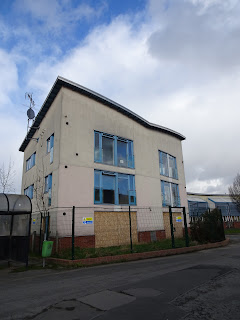
I will say that walking out of the station to find an abandoned block of flats doesn't fill you with the best first impression. The ground floor was boarded up, and I could see the vacant apartments inside. I'm not sure what happened here - was there a fire? - because the development looked new and interesting, with matching terraced homes nearby and solar panels on the roof for the full green effect. I passed through to the main road, past a cafe called - yes! - Station Cafe (presumably pronounced Station "Caff") and walked towards the town centre.

For centuries, there wasn't really much round this way. There were a couple of hamlets, Newton and Newington, but they were barely worth talking about. The main feature was the Ludlow to Shrewsbury road following the gap in the hills on its way to Church Stretton and beyond. At the turn of the 19th century, however, a coaching inn, the Craven Arms, opened on the road for travellers. When the railway followed a few decades later, they passed up naming the station after one of the generically titled villages in favour of the far more famous inn.
As happened all across Britain, the arrival of the railway meant the arrival of people, and a town grew up around the station to service the passengers. Craven Arms is, therefore, a town named after a railway station named after a pub.
Of course, this was catnip to me; I had to go to the Craven Arms in Craven Arms. That's a properly historic reason to visit the pub. Even Michael Portillo would find time to visit the pub that gave the town its name, in between biscuit factories and looking smug. I ended up disappointed.
The Craven Arms pub stands on a prominent roundabout in the centre of town and it is definitely, comprehensively, closed. I did some digging around to find out what happened. In February 2020 they posted on Facebook:
Due to flood damage the pub will be closed from 7pm tonight until Monday, sorry guys!!!
A follow-up post appeared on the 4th March:
Heyyy all just to keep you updated we now have heating again but we are still waiting on the coolers to be done 😞 fingers crossed will be this week
On the 20th March 2020, the government closed all the pubs and put us in lockdown. I imagine at that point the licensee thought "stuff this for a lark," packed up their goods and disappeared into the night. I don't blame them to be honest, but it did leave a big hole in the middle of town. If you're the town of Craven Arms, it feels wrong that the pub that gave you its name is no more. It was sad and also ominous; a real ravens leaving the tower moment.

I turned back to have a walk round the centre. The difference between a historic country town (like Church Stretton) and a more modern one like Craven Arms was glaringly apparent. It wasn't just the buildings, or the town's layout, spread over a series of straight roads that intersected at right angles. It was the difference between small, individual farming and more comprehensive, more industrial agriculture. One back street was dominated by a compound for selling farm machinery. Huge tractors and diggers and harvesters towered over the pavement. Meaty, hard, lumps of metal, made for churning up ground in huge quantities, made to carve and slice through crops.
On one corner, a dull modern office building was home to
Euro Quality Lambs - a company that promised to deliver "high quality lamb carcasses throughout the UK and Europe". This was the brutal reality of livestock farming. This wasn't fluffy ickle sheep prancing over hillsides, this was an animal to table processing centre.
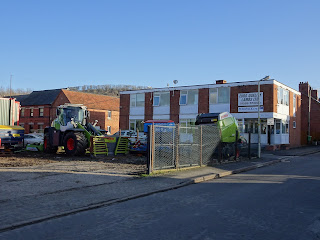
I walked away, wondering
when the lambs will stop screaming, and found the Market Hall. That was another difference from Church Stretton - the Victorian practicality of putting the market under cover, making it permanent, able to operate all week instead of one special day. It's no longer in use for that purpose however. Instead it's been transformed into the
Land of Lost Content.
Owner Stella Mitchell has built up, over the decades, a comprehensive collection of... stuff. There's no real other way to describe it. Packaging, signage, clothing, toys, general miscellany - it's spread throughout the market hall for you to take in.
The delightfully retro website - is that part of the collection? - has its full history and mission statement.
I didn't go in, for two reasons. The first was that you were meant to book ahead or, alternatively, call a number on the door for admission. I'd not booked and my social awkwardness couldn't cope with the idea of asking someone to open up a museum for me. I'd have felt obliged to walk round every inch of it so that I didn't let the owner down.
The second reason I didn't go in was the charge was eight quid. Am I cheap, or does that seem like an awful lot of money to look at someone's collection? I couldn't bring myself to pay for it so I walked away in search of Craven Arms' other big tourist attraction.
I'm sure the
Shropshire Hills Discovery Centre has a purpose. I'm sure it has a mission statement and an ambition. I'm not quite sure what it's for. It's a nice enough building, very Millennium Project-y, with all the eco credentials that come with that. It had a cafe and a gift shop, selling bird feeders and local gin and copies of
Precious Bane, a book set in the local area which I have read and remember being absolutely dreadful.

It also had an exhibition. Costing five pounds to get in. And once again, I was forced to say "nope". There was the promise of a film beyond the sign, and historical information, and a recreation of an Iron Age hut, and a replica of a mammoth found in the local area - not the actual skeleton itself, because that's at the Natural History Museum. A replica. For five British pounds. Yes, yes, support the arts, support our nation's history, support the culture, but that seemed to be a little bit piss-takey for me. I used the toilets - they were free at least - and left the building behind a party of school children. I imagine school trips were what kept the place going. I certainly couldn't imagine many people driving here specifically to visit.

Out the back of the centre are the Onny Meadows, an expanse of walking paths and landscaping based around the River Onny. February probably isn't the best time of year to visit the meadows, and let's be honest, I'd just romped over National Trust hillsides so this was a little underwhelming, but at least it was pretty and quiet and gave me a bench to sit and eat my sandwiches.
The question was, what to do with the rest of the afternoon, until my train at five o'clock? I had a couple of hours to kill now.
Be honest; you knew that was coming.
There was a big pub near the Discovery Centre that advertised rooms and good food and beer. This last one was a lie; their options were Carling, Worthington's, and a lot of lagers I had never heard of. I settled for a Worthington's and took a seat at an octagonal table in the window. The table was sticky from being continually sprayed with antibac. Above me was a line of fairy lights and the world's tiniest disco ball, barely a couple of inches in diameter, and not even slightly festive. There was a dance floor, with pale blue LEDs surrounding it, and an England flag hanging from the ceiling. The flag had a Sports Direct logo in the corner.
The only other patrons were two middle aged ladies and their elderly mother who were drinking coffee on the other side of the room, plus the boyfriend of the barmaid, who sat at the end of the bar fiddling with his phone while she served then joined in conspiratorial gossip when she was free. I drank my pint and left long before the burger and a pint offer kicked in at 5:30.
Now what? I walked round the town centre streets again, up one road, down another. I passed the only other pub and it looked somehow worse than the one I'd just left. The window of the general store advertised a
Flicks in the Sticks event at Aston on Clun village hall: a showing of
No Time To Die. Obviously I applauded Aston on Clun's taste in movies, while internally sniggering at the word
Clun. I seemingly had only one place left to go. Shopping.

There isn't an Asda in Craven Arms, or an Aldi, or a Morrisons. There's not even a Tesco Metro. Instead the locals shop at
Tuffins, a local supermarket with stores here and in Welshpool. I went inside for a poke around, past a sign that informed me that the Co-op had purchased their supplier and so they'd be selling their products but
"We are proud to be an Independent Supermarket and will NOT be turning into a Co-op".
You know when you go on holiday, and you end up in the local
supermarché, and it's all familiar and yet at the same time, deeply weird? That was what it was like wandering round Tuffins. It sort of made sense as a supermarket - there was milk and bread and orange juice - but the brands were odd, and the layout was strange. There was a garden centre next to the bakery. There was an aisle that sold balls of wool on one side and children's underwear on the other. It had a charmingly ramshackle feel to it, like it had started as a tiny shop but they'd kept buying the buildings next door and knocking through and then trying to find stuff to fill it with.
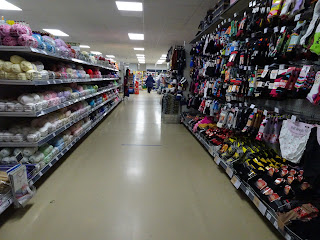
As I was so close to Wales - this part of England is known as the Welsh Marches, a historically fuzzy borderland between the two countries - I picked up a bara brith for the BF, plus a copy of Viz for the train journey home. It was nearly four o'clock when I left the store and I felt like I had exhausted Craven Arms. It was shutting up shop. I walked back to the station - the cafe was closed now - and took a seat on the cold platform to watch the sun start to go down.
Craven Arms wasn't a bad town, don't get me wrong. I bet lots of people love it. You're still in those wonderful hills, after all, and there's places to shop and eat. There was a charity bookshop that was selling some of the most bizarre and lurid paperbacks I've ever seen, and a new surgery building that looked modern and efficient. You've got a station with plenty of trains. It just wasn't for me. I was far more of a Church Stretton chap.




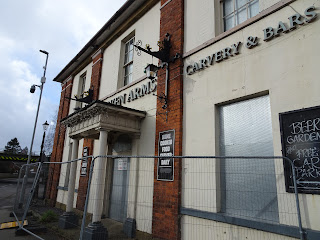



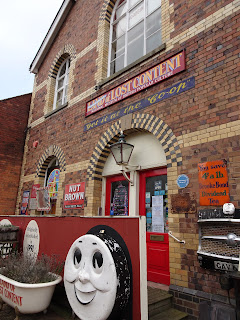




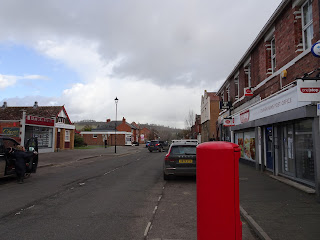





5 comments:
So glad you visited Tuffins on your sojourn to the 'Arms. Mike Parker waxes lyrical about the 'borderland legend' that was Mr Harry Tuffin in his book 'Real Powys', so it would have been a shame if you had missed out.
In the spirit of "Funiculi, Funicula', there actually exists a song about Clun and its neighbouring villages.
Clunton, Clunbury
Clungunford and Clun
Are the quietest places
Under the sun.
Its the opening of a poem by A E Housman, who - remarkably, given the beauty of the poetry - wrote about the area in 'A Shropshire Lad' before ever visiting it. It goes on:
"In valleys of springs of rivers,
By Ony and Teme and Clun,
The country for easy livers,
The quietest under the sun,"
"The land of lost content" is also a line from Housman.
I do hope you have returned or will return to see Ludlow and, if you can, Stokesay Castle. This is fine country.
"The table was sticky from being continually sprayed with antibac."
Shouldn't antibac make pub tables less sticky?
There used to be more Tuffins but they sold them to Midcounties Co-op, who then later sold the Craven Arms branch back to the family who had owned Tuffins previously.
I went in the Tuffins in Knighton, Powys, and it sounded exactly the same as Craven Arms - like they'd kept on building extensions to shove stuff in, and not really paid any attention to integrating everything together.
Well it was glorious. It reminded me of the rural French supermarkets we visited on holidays in the 1980s and 1990s. Ramshackle and bonkers.
May Craven Arms Tuffins never change!
Post a Comment